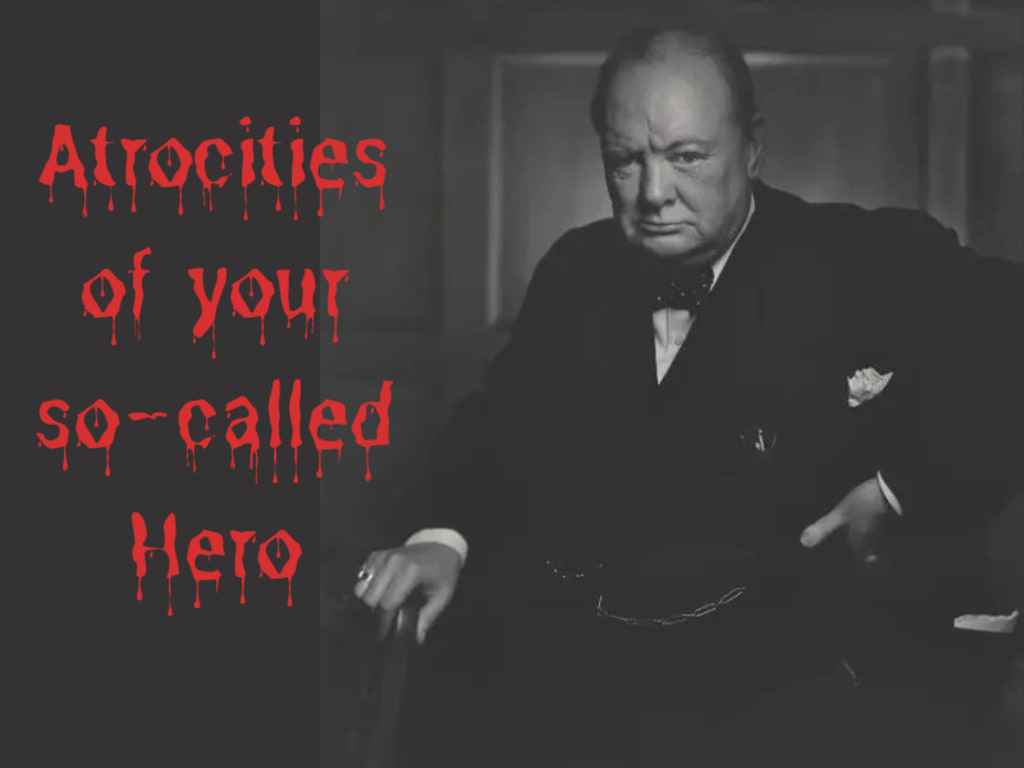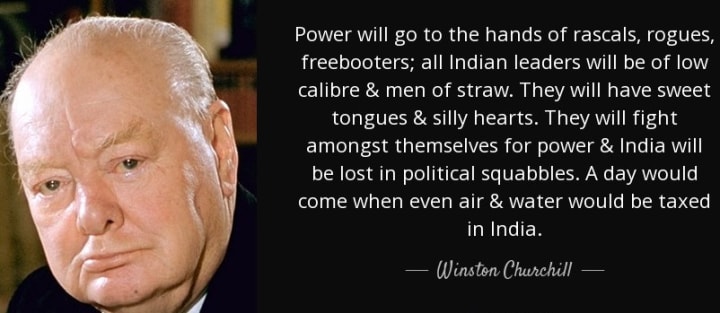Unveiling the Dark Chapter: Atrocities during Winston Churchill's Tenure in India
Change a lot of thingsUnveiling the Forgotten Horrors: Winston Churchill's Atrocities in India and Their Lasting Impact

Sir Winston Churchill, widely hailed as a prominent figure in British history, is renowned for his leadership during World War II and his resolute stance against Nazi Germany. However, while Churchill's wartime achievements are celebrated, it is important to acknowledge the controversial aspects of his legacy. Specifically, during his tenure as the British Prime Minister, Churchill's policies and actions resulted in severe atrocities committed against the people of India. This article aims to shed light on the often-overlooked dark chapter of Churchill's rule and its impact on India.
The Bengal Famine of 1943
One of the most tragic episodes during Churchill's tenure was the Bengal Famine of 1943. It is estimated that approximately three million people lost their lives due to starvation and malnutrition. Despite repeated warnings and pleas for assistance, Churchill's government failed to respond adequately. In fact, they exacerbated the situation by diverting essential supplies from India to support the war effort elsewhere. Churchill's callous indifference to the suffering of millions of Indians is a haunting testament to the atrocities committed under his watch.
Repressive Policies and Brutal Crackdowns
Churchill's administration implemented a series of repressive policies in India during his tenure, aimed at suppressing Indian independence movements. The Rowlatt Act of 1919, which extended emergency powers, enabled the British authorities to suppress civil liberties and curtail freedom of speech and assembly. The Jallianwala Bagh massacre in 1919 is a stark example of the consequences of such policies. British troops, under General Dyer's command, opened fire on a peaceful gathering, resulting in the deaths of hundreds of innocent Indians.
Divide and Rule Policy
Churchill actively pursued a "divide and rule" policy, exploiting communal divisions within Indian society to maintain British control. He inflamed religious tensions, particularly between Hindus and Muslims, in an effort to weaken the unity of the independence movement. Churchill's divisive tactics not only sowed seeds of discord but also contributed to the eventual partition of India in 1947, leading to widespread violence and displacement. Due to this India not only lost almost 900k sq. kilometers of area (which is almost 3 times of present-day United Kingdom or the British) but also lost its important cultural and traditional heritages.
Disregard for Indian Lives
Throughout his tenure, Churchill demonstrated a clear disregard for the value of Indian lives. His racist views and disdain for non-European cultures were evident in his statements and policies. He famously referred to Indians as "a beastly people with a beastly religion" and believed in the superiority of the British Empire. This mindset perpetuated a climate of oppression and discrimination, contributing to the suffering and loss of countless innocent lives.
The Need for Historical Reflection
It is important to critically examine the actions and policies of historical figures, even those revered for their accomplishments. While Churchill's leadership during World War II cannot be discounted, it is crucial to acknowledge the atrocities committed during his tenure in India. By recognizing the dark chapter of Churchill's rule, we gain a deeper understanding of the racist mindset of the colonialists and its enduring impact on nations and peoples.
Suppression of Nonviolent Resistance
Churchill's government responded to the nonviolent resistance movements led by Mahatma Gandhi and other Indian leaders with harsh measures. The Salt March of 1930, a symbolic act of civil disobedience against the British salt tax, was met with brutal repression. Indian protesters were beaten, arrested, and imprisoned, displaying the authoritarian nature of Churchill's rule. The violent suppression of peaceful dissent stifled the voices of millions of Indians seeking justice and self-determination.
Neglect of Indian Development
Churchill's policies not only perpetuated oppression but also hindered the socio-economic development of India. The allocation of resources and investments heavily favored British interests, leaving India with limited opportunities for growth. Development projects were often designed to benefit the colonial administration and exploit India's natural resources, rather than address the needs of the Indian population. This neglect resulted in widespread poverty, inadequate infrastructure, and limited access to education and healthcare.
During an interview with India's present External Affairs Minister Dr. S. Jaishankar, he said
India had two centuries of humiliation by the West in its predatory form it came to India in the mid-18th century. An economic study tried to estimate how much British took out of India, it ended up at a number of $45 trillion in today’s value
With this, you can easily estimate how India was before the British Rule and how the British used India to fulfill their own greed.
Impact on Cultural Heritage
Churchill's administration showed little regard for India's rich cultural heritage. Historical artifacts, sculptures, and treasures were plundered and taken away from India, diminishing the nation's cultural legacy. The removal of such invaluable artifacts not only deprived future generations of their heritage but also symbolized the colonial mindset that considered Indian culture as inferior and worthy of appropriation.
Reevaluation of Historical Figures
The atrocities committed during Churchill's tenure in India serve as a reminder of the importance of critically reevaluating historical figures. While acknowledging Churchill's leadership during World War II, it is crucial to confront the darker aspects of his rule and their repercussions. The reevaluation of historical figures allows for a more comprehensive understanding of the complexities of colonialism and its enduring effects on post-colonial societies.
Lessons for the Present and Future
The examination of Churchill's actions in India prompts us to reflect on contemporary issues of power, oppression, and the responsibility of leaders. It urges us to question the narratives that glorify historical figures without considering the harm they may have caused. By critically engaging with history, we can learn from past atrocities and strive for a more just and inclusive world, where the dignity and rights of all individuals are respected, regardless of their nationality or background.

In the context of the freedom movement in India, Churchill said
Power will go to the hands of rascals, rogues, freebooters; all Indian leaders will be of low calibre & men of straw. They will have sweet tongues and silly hearts. They will fight amongst themselves for power and India will be lost in political squabbles.
But you can easily look at what just happened in the United Kingdom and how an Indian is leading their country without any laziness or any racism to prevent themselves from a great economic crisis.
Conclusion
The atrocities committed by Winston Churchill's administration in India stand as a stark reminder of the devastating impact of colonial rule. From the suppression of nonviolent resistance to the neglect of Indian development and the perpetuation of communal tensions, Churchill's tenure left a deep scar on the Indian subcontinent. Recognizing and learning from these atrocities is essential to fostering a more inclusive and equitable future, free from the legacies of colonialism. By acknowledging the complete historical narrative, we can strive for a world where the dignity and rights of all people are upheld and atrocities are prevented from recurring.





Comments
There are no comments for this story
Be the first to respond and start the conversation.